 |
CopperSpice API
2.1.0
|
Provides support for wizards. More...
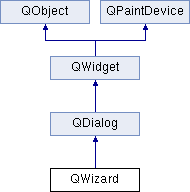
Public Typedefs | |
| using | WizardOptions = QFlags< WizardOption > |
 Public Typedefs inherited from QWidget Public Typedefs inherited from QWidget | |
| using | RenderFlags = QFlags< RenderFlag > |
Public Types | |
| enum | WizardButton |
| enum | WizardOption |
| enum | WizardPixmap |
| enum | WizardStyle |
 Public Types inherited from QDialog Public Types inherited from QDialog | |
| enum | DialogCode |
 Public Types inherited from QWidget Public Types inherited from QWidget | |
| enum | RenderFlag |
 Public Types inherited from QPaintDevice Public Types inherited from QPaintDevice | |
| enum | PaintDeviceMetric |
Public Signals | |
| void | currentIdChanged (int id) |
| void | customButtonClicked (int which) |
| void | helpRequested () |
| void | pageAdded (int id) |
| void | pageRemoved (int id) |
 Public Signals inherited from QDialog Public Signals inherited from QDialog | |
| void | accepted () |
| void | finished (int result) |
| void | rejected () |
 Public Signals inherited from QWidget Public Signals inherited from QWidget | |
| void | customContextMenuRequested (const QPoint &pos) |
| void | windowIconChanged (const QIcon &icon) |
| void | windowIconTextChanged (const QString &iconText) |
| void | windowTitleChanged (const QString &title) |
 Public Signals inherited from QObject Public Signals inherited from QObject | |
| void | destroyed (QObject *obj=nullptr) |
| void | objectNameChanged (const QString &objectName) |
Public Slots | |
| void | back () |
| void | next () |
| void | restart () |
 Public Slots inherited from QDialog Public Slots inherited from QDialog | |
| virtual void | accept () |
| virtual void | done (int result) |
| virtual int | exec () |
| virtual void | open () |
| virtual void | reject () |
| void | showExtension (bool showExt) |
 Public Slots inherited from QWidget Public Slots inherited from QWidget | |
| bool | close () |
| void | hide () |
| void | lower () |
| void | raise () |
| void | repaint () |
| void | setDisabled (bool disable) |
| void | setEnabled (bool enable) |
| void | setFocus () |
| void | setHidden (bool hidden) |
| void | setStyleSheet (const QString &styleSheet) |
| virtual void | setVisible (bool visible) |
| void | setWindowModified (bool modified) |
| void | setWindowTitle (const QString &title) |
| void | show () |
| void | showFullScreen () |
| void | showMaximized () |
| void | showMinimized () |
| void | showNormal () |
| void | update () |
 Public Slots inherited from QObject Public Slots inherited from QObject | |
| void | deleteLater () |
Public Methods | |
| QWizard (QWidget *parent=nullptr, Qt::WindowFlags flags=Qt::EmptyFlag) | |
| ~QWizard () | |
| int | addPage (QWizardPage *page) |
| QAbstractButton * | button (WizardButton which) const |
| QString | buttonText (WizardButton which) const |
| int | currentId () const |
| QWizardPage * | currentPage () const |
| QVariant | field (const QString &name) const |
| bool | hasVisitedPage (int id) const |
| virtual int | nextId () const |
| WizardOptions | options () const |
| QWizardPage * | page (int id) const |
| QList< int > | pageIds () const |
| QPixmap | pixmap (WizardPixmap which) const |
| void | removePage (int id) |
| void | setButton (WizardButton which, QAbstractButton *button) |
| void | setButtonLayout (const QList< WizardButton > &layout) |
| void | setButtonText (WizardButton which, const QString &text) |
| void | setDefaultProperty (const QString &className, const QString &property, const QString &changedSignal) |
| void | setField (const QString &name, const QVariant &value) |
| void | setOption (WizardOption option, bool on=true) |
| void | setOptions (WizardOptions options) |
| void | setPage (int id, QWizardPage *page) |
| void | setPixmap (WizardPixmap which, const QPixmap &pixmap) |
| void | setSideWidget (QWidget *widget) |
| void | setStartId (int id) |
| void | setSubTitleFormat (Qt::TextFormat format) |
| void | setTitleFormat (Qt::TextFormat format) |
| void | setVisible (bool visible) override |
| void | setWizardStyle (WizardStyle style) |
| QWidget * | sideWidget () const |
| QSize | sizeHint () const override |
| int | startId () const |
| Qt::TextFormat | subTitleFormat () const |
| bool | testOption (WizardOption option) const |
| Qt::TextFormat | titleFormat () const |
| virtual bool | validateCurrentPage () |
| QList< int > | visitedPages () const |
| WizardStyle | wizardStyle () const |
 Public Methods inherited from QDialog Public Methods inherited from QDialog | |
| QDialog (QWidget *parent=nullptr, Qt::WindowFlags flags=Qt::EmptyFlag) | |
| ~QDialog () | |
| QWidget * | extension () const |
| bool | isSizeGripEnabled () const |
| QSize | minimumSizeHint () const override |
| Qt::Orientation | orientation () const |
| int | result () const |
| void | setExtension (QWidget *extension) |
| void | setModal (bool modal) |
| void | setOrientation (Qt::Orientation orientation) |
| void | setResult (int result) |
| void | setSizeGripEnabled (bool enabled) |
| void | setVisible (bool visible) override |
 Public Methods inherited from QWidget Public Methods inherited from QWidget | |
| QWidget (QWidget *parent=nullptr, Qt::WindowFlags flags=Qt::EmptyFlag) | |
| ~QWidget () | |
| bool | acceptDrops () const |
| QString | accessibleDescription () const |
| QString | accessibleName () const |
| QList< QAction * > | actions () const |
| void | activateWindow () |
| void | addAction (QAction *action) |
| void | addActions (const QList< QAction * > &actions) |
| void | adjustSize () |
| bool | autoFillBackground () const |
| QPalette::ColorRole | backgroundRole () const |
| QBackingStore * | backingStore () const |
| QSize | baseSize () const |
| QWidget * | childAt (const QPoint &position) const |
| QWidget * | childAt (int x, int y) const |
| QRect | childrenRect () const |
| QRegion | childrenRegion () const |
| void | clearFocus () |
| void | clearMask () |
| QMargins | contentsMargins () const |
| QRect | contentsRect () const |
| Qt::ContextMenuPolicy | contextMenuPolicy () const |
| QCursor | cursor () const |
| WId | effectiveWinId () const |
| void | ensurePolished () const |
| Qt::FocusPolicy | focusPolicy () const |
| QWidget * | focusProxy () const |
| QWidget * | focusWidget () const |
| const QFont & | font () const |
| QFontInfo | fontInfo () const |
| QFontMetrics | fontMetrics () const |
| QPalette::ColorRole | foregroundRole () const |
| QRect | frameGeometry () const |
| QSize | frameSize () const |
| const QRect & | geometry () const |
| void | getContentsMargins (int *left, int *top, int *right, int *bottom) const |
| QPixmap | grab (const QRect &rectangle=QRect (QPoint (0, 0), QSize (-1,-1))) |
| void | grabGesture (Qt::GestureType gestureType, Qt::GestureFlags flags=Qt::GestureFlags ()) |
| void | grabKeyboard () |
| void | grabMouse () |
| void | grabMouse (const QCursor &cursor) |
| int | grabShortcut (const QKeySequence &key, Qt::ShortcutContext context=Qt::WindowShortcut) |
| QGraphicsEffect * | graphicsEffect () const |
| QGraphicsProxyWidget * | graphicsProxyWidget () const |
| bool | hasEditFocus () const |
| bool | hasFocus () const |
| virtual bool | hasHeightForWidth () const |
| bool | hasMouseTracking () const |
| int | height () const |
| virtual int | heightForWidth (int width) const |
| Qt::InputMethodHints | inputMethodHints () const |
| virtual QVariant | inputMethodQuery (Qt::InputMethodQuery query) const |
| void | insertAction (QAction *before, QAction *action) |
| void | insertActions (QAction *before, QList< QAction * > actions) |
| bool | isActiveWindow () const |
| bool | isAncestorOf (const QWidget *child) const |
| bool | isEnabled () const |
| bool | isEnabledTo (const QWidget *parent) const |
| bool | isEnabledToTLW () const |
| bool | isFullScreen () const |
| bool | isHidden () const |
| bool | isMaximized () const |
| bool | isMinimized () const |
| bool | isModal () const |
| bool | isTopLevel () const |
| bool | isVisible () const |
| bool | isVisibleTo (const QWidget *parent) const |
| bool | isWindow () const |
| bool | isWindowModified () const |
| QLayout * | layout () const |
| Qt::LayoutDirection | layoutDirection () const |
| QLocale | locale () const |
| QPoint | mapFrom (const QWidget *parent, const QPoint &pos) const |
| QPoint | mapFromGlobal (const QPoint &pos) const |
| QPoint | mapFromParent (const QPoint &pos) const |
| QPoint | mapTo (const QWidget *parent, const QPoint &pos) const |
| QPoint | mapToGlobal (const QPoint &pos) const |
| QPoint | mapToParent (const QPoint &pos) const |
| QRegion | mask () const |
| int | maximumHeight () const |
| QSize | maximumSize () const |
| int | maximumWidth () const |
| int | minimumHeight () const |
| QSize | minimumSize () const |
| int | minimumWidth () const |
| void | move (const QPoint &point) |
| void | move (int x, int y) |
| QWidget * | nativeParentWidget () const |
| QWidget * | nextInFocusChain () const |
| QRect | normalGeometry () const |
| void | overrideWindowFlags (Qt::WindowFlags flags) |
| QPaintEngine * | paintEngine () const override |
| const QPalette & | palette () const |
| QWidget * | parentWidget () const |
| QPoint | pos () const |
| QWidget * | previousInFocusChain () const |
| QRect | rect () const |
| void | releaseKeyboard () |
| void | releaseMouse () |
| void | releaseShortcut (int id) |
| void | removeAction (QAction *action) |
| void | render (QPaintDevice *target, const QPoint &targetOffset=QPoint (), const QRegion &sourceRegion=QRegion (), RenderFlags renderFlags=RenderFlags (DrawWindowBackground|DrawChildren)) |
| void | render (QPainter *painter, const QPoint &targetOffset=QPoint (), const QRegion &sourceRegion=QRegion (), RenderFlags renderFlags=RenderFlags (DrawWindowBackground|DrawChildren)) |
| void | repaint (const QRect &rect) |
| void | repaint (const QRegion ®ion) |
| void | repaint (int x, int y, int w, int h) |
| void | resize (const QSize &size) |
| void | resize (int w, int h) |
| bool | restoreGeometry (const QByteArray &geometry) |
| QByteArray | saveGeometry () const |
| void | scroll (int dx, int dy) |
| void | scroll (int dx, int dy, const QRect &rect) |
| void | setAcceptDrops (bool on) |
| void | setAccessibleDescription (const QString &description) |
| void | setAccessibleName (const QString &name) |
| void | setAttribute (Qt::WidgetAttribute attribute, bool enable=true) |
| void | setAutoFillBackground (bool enable) |
| void | setBackgroundRole (QPalette::ColorRole role) |
| void | setBaseSize (const QSize &size) |
| void | setBaseSize (int basew, int baseh) |
| void | setContentsMargins (const QMargins &margins) |
| void | setContentsMargins (int left, int top, int right, int bottom) |
| void | setContextMenuPolicy (Qt::ContextMenuPolicy policy) |
| void | setCursor (const QCursor &cursor) |
| void | setEditFocus (bool enable) |
| void | setFixedHeight (int h) |
| void | setFixedSize (const QSize &size) |
| void | setFixedSize (int w, int h) |
| void | setFixedWidth (int w) |
| void | setFocus (Qt::FocusReason reason) |
| void | setFocusPolicy (Qt::FocusPolicy policy) |
| void | setFocusProxy (QWidget *widget) |
| void | setFont (const QFont &font) |
| void | setForegroundRole (QPalette::ColorRole role) |
| void | setGeometry (const QRect &rect) |
| void | setGeometry (int x, int y, int w, int h) |
| void | setGraphicsEffect (QGraphicsEffect *effect) |
| void | setInputMethodHints (Qt::InputMethodHints hints) |
| void | setLayout (QLayout *layout) |
| void | setLayoutDirection (Qt::LayoutDirection direction) |
| void | setLocale (const QLocale &locale) |
| void | setMask (const QBitmap &bitmap) |
| void | setMask (const QRegion ®ion) |
| void | setMaximumHeight (int maxh) |
| void | setMaximumSize (const QSize &size) |
| void | setMaximumSize (int maxw, int maxh) |
| void | setMaximumWidth (int maxw) |
| void | setMinimumHeight (int minh) |
| void | setMinimumSize (const QSize &size) |
| void | setMinimumSize (int minw, int minh) |
| void | setMinimumWidth (int minw) |
| void | setMouseTracking (bool enable) |
| void | setPalette (const QPalette &palette) |
| void | setParent (QWidget *parent) |
| void | setParent (QWidget *parent, Qt::WindowFlags flags) |
| void | setShortcutAutoRepeat (int id, bool enable=true) |
| void | setShortcutEnabled (int id, bool enable=true) |
| void | setSizeIncrement (const QSize &size) |
| void | setSizeIncrement (int w, int h) |
| void | setSizePolicy (QSizePolicy policy) |
| void | setSizePolicy (QSizePolicy::Policy horizontal, QSizePolicy::Policy vertical) |
| void | setStatusTip (const QString &data) |
| void | setStyle (QStyle *style) |
| void | setToolTip (const QString &data) |
| void | setToolTipDuration (int msec) |
| void | setUpdatesEnabled (bool enable) |
| void | setWhatsThis (const QString &str) |
| void | setWindowFilePath (const QString &filePath) |
| void | setWindowFlags (Qt::WindowFlags flags) |
| void | setWindowIcon (const QIcon &icon) |
| void | setWindowModality (Qt::WindowModality windowModality) |
| void | setWindowOpacity (qreal level) |
| void | setWindowRole (const QString &role) |
| void | setWindowState (Qt::WindowStates windowState) |
| QSize | size () const |
| QSize | sizeIncrement () const |
| QSizePolicy | sizePolicy () const |
| void | stackUnder (QWidget *widget) |
| QString | statusTip () const |
| QStyle * | style () const |
| QString | styleSheet () const |
| bool | testAttribute (Qt::WidgetAttribute attribute) const |
| QString | toolTip () const |
| int | toolTipDuration () const |
| QWidget * | topLevelWidget () const |
| bool | underMouse () const |
| void | ungrabGesture (Qt::GestureType gestureType) |
| void | unsetCursor () |
| void | unsetLayoutDirection () |
| void | unsetLocale () |
| void | update (const QRect &rect) |
| void | update (const QRegion ®ion) |
| void | update (int x, int y, int w, int h) |
| void | updateGeometry () |
| bool | updatesEnabled () const |
| QRegion | visibleRegion () const |
| QString | whatsThis () const |
| int | width () const |
| QWidget * | window () const |
| QString | windowFilePath () const |
| Qt::WindowFlags | windowFlags () const |
| QWindow * | windowHandle () const |
| QIcon | windowIcon () const |
| Qt::WindowModality | windowModality () const |
| qreal | windowOpacity () const |
| QString | windowRole () const |
| Qt::WindowStates | windowState () const |
| QString | windowTitle () const |
| Qt::WindowType | windowType () const |
| WId | winId () const |
| int | x () const |
| int | y () const |
 Public Methods inherited from QObject Public Methods inherited from QObject | |
| QObject (QObject *parent=nullptr) | |
| ~QObject () | |
| bool | blockSignals (bool block) |
| const QList< QObject * > & | children () const |
| bool | connect (const QObject *sender, const QString &signalMethod, const QString &location, const QString &slotMethod, Qt::ConnectionType type=Qt::AutoConnection) |
| bool | connect (const QObject *sender, const QString &signalMethod, const QString &slotMethod, Qt::ConnectionType type=Qt::AutoConnection) |
| bool | disconnect (const QObject *receiver, const QString &slotMethod=QString ()) const |
| bool | disconnect (const QString &signalMethod, const QString &location, const QObject *receiver=nullptr, const QString &slotMethod=QString ()) const |
| bool | disconnect (const QString &signalMethod=QString (), const QObject *receiver=nullptr, const QString &slotMethod=QString ()) const |
| void | dumpObjectInfo () |
| void | dumpObjectTree () |
| QList< QString > | dynamicPropertyNames () const |
| virtual bool | event (QEvent *event) |
| virtual bool | eventFilter (QObject *watched, QEvent *event) |
| template<typename T > | |
| T | findChild (const QString &childName=QString ()) const |
| template<class T > | |
| QList< T > | findChildren (const QRegularExpression ®Exp, Qt::FindChildOptions options=Qt::FindChildrenRecursively) const |
| template<class T > | |
| QList< T > | findChildren (const QString &childName=QString (), Qt::FindChildOptions options=Qt::FindChildrenRecursively) const |
| bool | inherits (const QString &className) const |
| void | installEventFilter (QObject *filterObj) |
| bool | isWidgetType () const |
| bool | isWindowType () const |
| void | killTimer (int id) |
| const QMetaObject * | metaObject () const |
| void | moveToThread (QThread *targetThread) |
| QString | objectName () const |
| QObject * | parent () const |
| template<class T = QVariant> | |
| T | property (const QString &name) const |
| void | removeEventFilter (QObject *obj) |
| void | setObjectName (const QString &name) |
| void | setParent (QObject *parent) |
| bool | setProperty (const QString &name, const QVariant &value) |
| bool | signalsBlocked () const |
| int | startTimer (int interval, Qt::TimerType timerType=Qt::CoarseTimer) |
| QThread * | thread () const |
 Public Methods inherited from QPaintDevice Public Methods inherited from QPaintDevice | |
| virtual | ~QPaintDevice () |
| int | colorCount () const |
| int | depth () const |
| int | devicePixelRatio () const |
| qreal | devicePixelRatioF () const |
| int | height () const |
| int | heightMM () const |
| int | logicalDpiX () const |
| int | logicalDpiY () const |
| bool | paintingActive () const |
| int | physicalDpiX () const |
| int | physicalDpiY () const |
| int | width () const |
| int | widthMM () const |
Protected Methods | |
| virtual void | cleanupPage (int id) |
| void | done (int result) override |
| bool | event (QEvent *event) override |
| virtual void | initializePage (int id) |
| bool | nativeEvent (const QByteArray &eventType, void *message, long *result) override |
| void | paintEvent (QPaintEvent *event) override |
| void | resizeEvent (QResizeEvent *event) override |
 Protected Methods inherited from QDialog Protected Methods inherited from QDialog | |
| void | closeEvent (QCloseEvent *event) override |
| void | contextMenuEvent (QContextMenuEvent *event) override |
| bool | eventFilter (QObject *object, QEvent *event) override |
| void | keyPressEvent (QKeyEvent *event) override |
| void | showEvent (QShowEvent *event) override |
 Protected Methods inherited from QWidget Protected Methods inherited from QWidget | |
| virtual void | actionEvent (QActionEvent *event) |
| virtual void | changeEvent (QEvent *event) |
| void | create (WId window=0, bool initializeWindow=true, bool destroyOldWindow=true) |
| void | destroy (bool destroyWindow=true, bool destroySubWindows=true) |
| virtual void | dragEnterEvent (QDragEnterEvent *event) |
| virtual void | dragLeaveEvent (QDragLeaveEvent *event) |
| virtual void | dragMoveEvent (QDragMoveEvent *event) |
| virtual void | dropEvent (QDropEvent *event) |
| virtual void | enterEvent (QEvent *event) |
| bool | event (QEvent *event) override |
| virtual void | focusInEvent (QFocusEvent *event) |
| bool | focusNextChild () |
| virtual bool | focusNextPrevChild (bool next) |
| virtual void | focusOutEvent (QFocusEvent *event) |
| bool | focusPreviousChild () |
| virtual void | hideEvent (QHideEvent *event) |
| void | initPainter (QPainter *painter) const override |
| virtual void | inputMethodEvent (QInputMethodEvent *event) |
| virtual void | keyReleaseEvent (QKeyEvent *event) |
| virtual void | leaveEvent (QEvent *event) |
| int | metric (PaintDeviceMetric metric) const override |
| virtual void | mouseDoubleClickEvent (QMouseEvent *event) |
| virtual void | mouseMoveEvent (QMouseEvent *event) |
| virtual void | mousePressEvent (QMouseEvent *event) |
| virtual void | mouseReleaseEvent (QMouseEvent *event) |
| virtual void | moveEvent (QMoveEvent *event) |
| virtual void | tabletEvent (QTabletEvent *event) |
| virtual void | wheelEvent (QWheelEvent *event) |
 Protected Methods inherited from QObject Protected Methods inherited from QObject | |
| virtual void | childEvent (QChildEvent *event) |
| virtual void | connectNotify (const QMetaMethod &signalMethod) const |
| virtual void | customEvent (QEvent *event) |
| virtual void | disconnectNotify (const QMetaMethod &signalMethod) const |
| bool | isSignalConnected (const QMetaMethod &signalMethod) const |
| int | receivers (const QString &signal) const |
| QObject * | sender () const |
| int | senderSignalIndex () const |
| virtual void | timerEvent (QTimerEvent *event) |
 Protected Methods inherited from QPaintDevice Protected Methods inherited from QPaintDevice | |
| QPaintDevice () | |
Friends | |
| class | QWizardPage |
Additional Inherited Members | |
 Static Public Methods inherited from QWidget Static Public Methods inherited from QWidget | |
| static QWidget * | createWindowContainer (QWindow *window, QWidget *parent=nullptr, Qt::WindowFlags flags=Qt::EmptyFlag) |
| static QWidget * | find (WId id) |
| static QWidget * | keyboardGrabber () |
| static QWidget * | mouseGrabber () |
| static void | setTabOrder (QWidget *firstWidget, QWidget *secondWidget) |
 Static Public Methods inherited from QObject Static Public Methods inherited from QObject | |
| static bool | connect (const QObject *sender, const QMetaMethod &signalMethod, const QObject *receiver, const QMetaMethod &slotMethod, Qt::ConnectionType type=Qt::AutoConnection) |
| static bool | connect (const QObject *sender, const QString &signalMethod, const QObject *receiver, const QString &slotMethod, Qt::ConnectionType type=Qt::AutoConnection, const QString &location=QString ()) |
| static bool | connect (const QObject *sender, const QString &signalMethod, const QString &location, const QObject *receiver, const QString &slotMethod, Qt::ConnectionType type=Qt::AutoConnection) |
| template<class Sender , class SignalClass , class... SignalArgs, class Receiver , class SlotClass , class... SlotArgs, class SlotReturn > | |
| static bool | connect (const Sender *sender, void (SignalClass::*signalMethod)(SignalArgs...), const Receiver *receiver, SlotReturn (SlotClass::*slotMethod)(SlotArgs...), Qt::ConnectionType type=Qt::AutoConnection) |
| template<class Sender , class SignalClass , class... SignalArgs, class Receiver , class T > | |
| static bool | connect (const Sender *sender, void (SignalClass::*signalMethod)(SignalArgs...), const Receiver *receiver, T slotLambda, Qt::ConnectionType type=Qt::AutoConnection) |
| static bool | disconnect (const QObject *sender, const QMetaMethod &signalMethod, const QObject *receiver, const QMetaMethod &slotMethod) |
| static bool | disconnect (const QObject *sender, const QString &signalMethod, const QObject *receiver, const QString &slotMethod) |
| static bool | disconnect (const QObject *sender, const QString &signalMethod, const QString &location, const QObject *receiver, const QString &slotMethod) |
| static bool | disconnect (const QObject *sender, std::nullptr_t, const QObject *receiver, std::nullptr_t) |
| template<class Sender , class SignalClass , class... SignalArgs, class Receiver , class SlotClass , class... SlotArgs, class SlotReturn > | |
| static bool | disconnect (const Sender *sender, void (SignalClass::*signalMethod)(SignalArgs...), const Receiver *receiver, SlotReturn (SlotClass::*slotMethod)(SlotArgs...)) |
| template<class Sender , class SignalClass , class... SignalArgs, class Receiver > | |
| static bool | disconnect (const Sender *sender, void (SignalClass::*signalMethod)(SignalArgs...), const Receiver *receiver, std::nullptr_t slotMethod=nullptr) |
| template<class Sender , class SignalClass , class... SignalArgs, class Receiver , class T > | |
| static bool | disconnect (const Sender *sender, void (SignalClass::*signalMethod)(SignalArgs...), const Receiver *receiver, T slotMethod) |
| static QMetaObject & | staticMetaObject () |
| static QString | tr (const char *text, const char *comment=nullptr, std::optional< int > numArg=std::optional< int >()) |
 Protected Slots inherited from QWidget Protected Slots inherited from QWidget | |
| void | updateMicroFocus () |
 Related Functions inherited from QWidget Related Functions inherited from QWidget | |
| QWidgetList | |
| WId | |
 Related Functions inherited from QObject Related Functions inherited from QObject | |
| T | qobject_cast (QObject *object) |
| QObjectList | |
Detailed Description
The QWizard class provides support for wizards. A wizard (also called an assistant on Mac OS X) is a special type of input dialog that consists of a sequence of pages. The purpose of a wizard is to guide the user through a process step by step. Wizards are useful for complex or infrequent tasks users may find difficult to learn.
QWizard inherits QDialog and represents a wizard. Each page is a QWizardPage (a QWidget subclass). To create your own wizards use these classes directly or inherit from them and reimplement the virtual methods.
Simple Example
The following example illustrates how to create wizard pages and then add them to a wizard.
Wizard Look and Feel
QWizard supports four different styles. You can explicitly set the style using setWizardStyle().
| ClassicStyle | ModernStyle | MacStyle | AeroStyle |
|---|---|---|---|
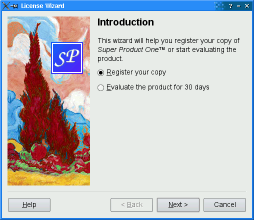 | 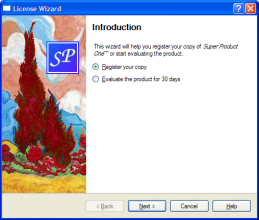 | 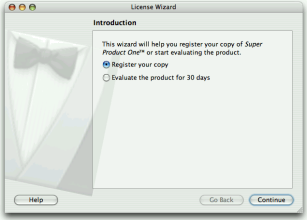 | 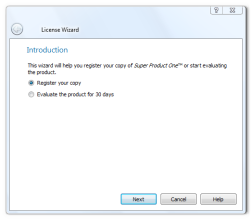 |
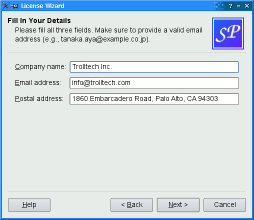 | 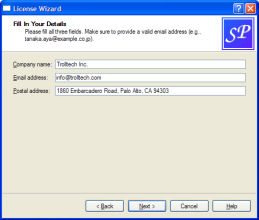 | 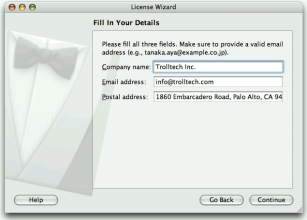 | 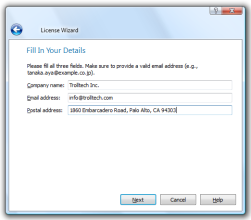 |
The AeroStyle is only available on Windows Vista or newer with alpha compositing enabled. ModernStyle is used as a fallback when this condition is not met.
In addition to the wizard style there are several other options to modify the look and feel of each wizard. These can be set using setOption() or setOptions(). For example, the HaveHelpButton option displays a Help button.
The order of the wizard buttons can be set to any arbitrary order using setButtonLayout() and up to three custom buttons like Print can be added. This is achieved by calling setButton() or setButtonText() with CustomButton1, CustomButton2, or CustomButton3 to set the button and then enable the HaveCustomButton1, HaveCustomButton2, or HaveCustomButton3 options. When the user clicks a custom button the customButtonClicked() signal will be emitted.
Elements of a Wizard Page
Wizards consist of a sequence of QWizardPages. Only one page will be visible at a time. A page has the following attributes.
- Title
- Subtitle
-
Set of pixmaps which may or may not be displayed, depends on the wizard style
- WatermarkPixmap (used by ClassicStyle and ModernStyle)
- BannerPixmap (used by ModernStyle)
- LogoPixmap (used by ClassicStyle and ModernStyle)
- BackgroundPixmap (used by MacStyle)
Wizard Layout
When a subTitle is set QWizard displays it in a header, in which case it also uses the BannerPixmap and the LogoPixmap to decorate the header. The QWizard::WatermarkPixmap determines what image will be displayed on the left side, below the header. At the bottom of the wizard there is a row of buttons for the user to navigate through the pages.
The title and subtitle are set by calling QWizardPage::setTitle() and QWizardPage::setSubTitle() on the individual pages. They may be plain text or HTML. The pixmaps can be set globally for the entire wizard using setPixmap(), or on a per-page basis using QWizardPage::setPixmap().
The QWizardPage widget occupies the area between the header, the watermark, and the row of buttons. Typically, the page uses a QGridLayout with standard child widgets like QLabels and QLineEdits.
The watermark, banner, and logo pixmaps will be ignored by the MacStyle. If the QWizard::BackgroundPixmap is set, it is used as the background for the wizard, otherwise a default "assistant" image is used.
The diagram below shows how QWizard renders these attributes in the ModernStyle.
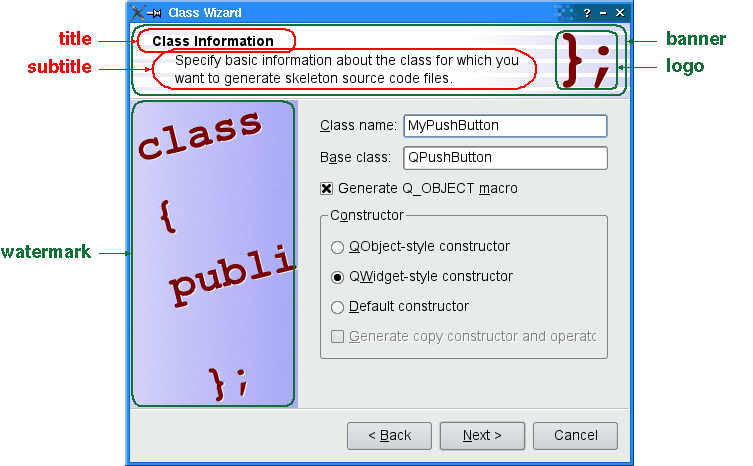
If the wizard style is MacStyle the page will look very different.
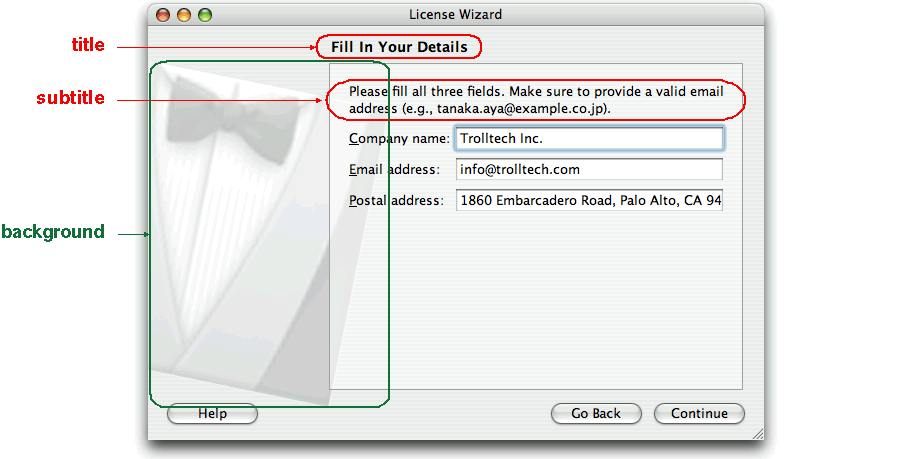
Creating Linear Wizards
Most wizards have a linear structure with page 1 followed by page 2 and so on until the last page. A linear wizard is created by instantiating a class which inherits from QWizardPage. The new object is then inserted into the wizard by calling addPage(). By default the pages are shown in the wizard in the order in which they were added.
When a page is about to be shown QWizard calls initializePage() to populate the page with default values. By default this method does nothing. It can be reimplemented to initialize the widgets on the current page.
If the user presses the Back button then cleanupPage() is called. The default implementation resets the widget values back to their original values, before initializePage() was invoked. If you want the Back button to be non-destructive and keep the values entered by the user, enable the QWizard::IndependentPages option.
Registering and Using Fields
In some wizards the contents of a page may affect the default values of the fields of another page. To make it easy to communicate between pages, QWizard supports a mechanism which allows registering a field like a QLineEdit on one page and then accessing its value from any page. To register a field call QWizardPage::registerField(). When creating a field pass a unique field name and a widget.
The example shown below creates three fields className, baseClass, and objectMacro. There are also mandatory fields which must contain user input before advancing to the next page. The asterisk appended to the name next to className denotes a mandatory field. When a page has mandatory fields the Next and/or Finish buttons are enabled only when all mandatory fields are filled.
When creating a field a property name and a "changed" signal can be passed as the third and fourth arguments. This is usually not necessary for the common widgets like QLineEdit or QCheckBox because QWizard knows which properties to look for.
The following code is a sample implementation of initializePage(). The method QWizardPage::field() is used to access the contents of the className field and the value is returned as a QVariant. The ".toString()" will convert the QVariant to a QString. The remaining three lines are used to initialize the widgets on the OutputFilePage.
Validation
To consider a field "filled" QWizard compares the current value of the field to the original value. If they are different the field is considered filled. For QLineEdit and QAbstractSpinBox subclasses, QWizard also checks if hasAcceptableInput() returns true.
If the QWizard mandatory field is not sufficient for validation consider the following options.
(1) Enable or disable the Next and Finish buttons based on the validation of the user input.
(2) Override validateCurrentPage() to perform some validation and show an error message if the user has entered incomplete or invalid information. If the validateCurrentPage()returns true either the next page is shown or the wizard finishes, otherwise the current page will remain displayed.
(3) Another approach is to inherit from QWizardPage and override the QWizardPage::isComplete() method. Emit the QWizardPage::completeChanged() signal whenever the page becomes complete or incomplete.
Creating Non-Linear Wizards
Some wizards can be complex and require which require showing the pages in some unique order based on the information provided by the user.
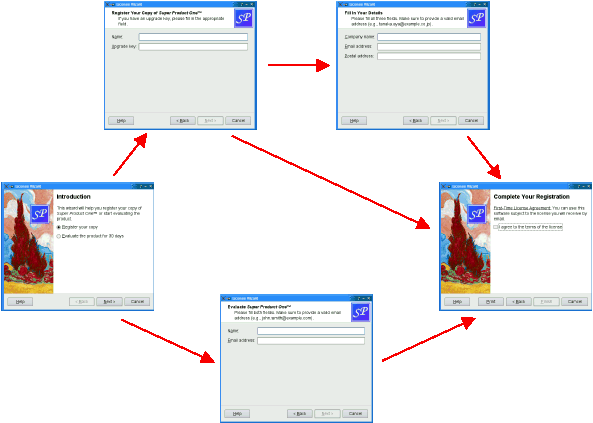
In complex wizards each page is identified by an ID. These IDs are typically defined using an enum.
Pages are inserted into the wizard using setPage() and an ID is passed as the first parameter.
By default the pages are shown in increasing ID order. To provide a dynamic order override the QWizardPage::nextId() method as shown below.
As an alternative, the logic can be located together by overriding QWizard::nextId().
To specify the start page call setStartId(). To test whether a page has been visited call hasVisitedPage().
- See also
- QWizardPage
Member Typedef Documentation
Typedef for QFlags<WizardOption> which contains an OR combination of WizardOption values.
Refer to QWizard::WizardOption for the enum documentation.
Member Enumeration Documentation
This enum specifies the buttons in a wizard.
| Constant | Value | Description |
|---|---|---|
QWizard::BackButton | 0 | Back button (Go Back on Mac OS X) |
QWizard::NextButton | 1 | Next button (Continue on Mac OS X) |
QWizard::CommitButton | 2 | Commit button |
QWizard::FinishButton | 3 | Finish button (Done on Mac OS X) |
QWizard::CancelButton | 4 | Cancel button (refer to NoCancelButton) |
QWizard::HelpButton | 5 | Help button (refer to HaveHelpButton) |
QWizard::CustomButton1 | 6 | First user-defined button (refer to HaveCustomButton1) |
QWizard::CustomButton2 | 7 | Second user-defined button (refer to HaveCustomButton2) |
QWizard::CustomButton3 | 8 | Third user-defined button (refer to HaveCustomButton3) |
The following value is only useful when calling setButtonLayout():
| Constant | Value | Description |
|---|---|---|
QWizard::Stretch | 9 | A horizontal stretch in the button layout |
This enum specifies various options which affect the look and feel of a wizard.
| Constant | Value | Description |
|---|---|---|
| QWizard::IndependentPages | 0x00000001 | Pages are independent of each other, they do not derive values from each other. |
| QWizard::IgnoreSubTitles | 0x00000002 | Do not show any subtitles, even if they are set. |
| QWizard::ExtendedWatermarkPixmap | 0x00000004 | Extend any WatermarkPixmap all the way down to the window's edge. |
| QWizard::NoDefaultButton | 0x00000008 | Do not make the Next or Finish button the dialog's default button. |
| QWizard::NoBackButtonOnStartPage | 0x00000010 | Do not show the Back button on the start page. |
| QWizard::NoBackButtonOnLastPage | 0x00000020 | Do not show the Back button on the last page. |
| QWizard::DisabledBackButtonOnLastPage | 0x00000040 | Disable the Back button on the last page. |
| QWizard::HaveNextButtonOnLastPage | 0x00000080 | Show the (disabled) Next button on the last page. |
| QWizard::HaveFinishButtonOnEarlyPages | 0x00000100 | Show the (disabled) Finish button on non-final pages. |
| QWizard::NoCancelButton | 0x00000200 | Do not show the Cancel button. |
| QWizard::CancelButtonOnLeft | 0x00000400 | Put the Cancel button on the left of Back (rather than on the right of Finish or Next). |
| QWizard::HaveHelpButton | 0x00000800 | Show the Help button. |
| QWizard::HelpButtonOnRight | 0x00001000 | Put the Help button on the far right of the button layout (rather than on the far left). |
| QWizard::HaveCustomButton1 | 0x00002000 | Show the first user-defined button (CustomButton1). |
| QWizard::HaveCustomButton2 | 0x00004000 | Show the second user-defined button (CustomButton2). |
| QWizard::HaveCustomButton3 | 0x00008000 | Show the third user-defined button (CustomButton3). |
| QWizard::NoCancelButtonOnLastPage | 0x00010000 | Do not show the Cancel button on the last page. |
- See also
- setOptions(), setOption(), testOption()
This enum specifies the pixmaps which can be associated with a page.
| Constant | Value | Description |
|---|---|---|
QWizard::WatermarkPixmap | 0 | Tall pixmap on the left side of a ClassicStyle or ModernStyle page |
QWizard::LogoPixmap | 1 | Small pixmap on the right side of a ClassicStyle or ModernStyle page header |
QWizard::BannerPixmap | 2 | Pixmap that occupies the background of a ModernStyle page header |
QWizard::BackgroundPixmap | 3 | Pixmap that occupies the background of a MacStyle wizard |
- See also
- setPixmap(), QWizardPage::setPixmap()
| enum QWizard::WizardStyle |
This enum specifies the different looks supported by QWizard.
| Constant | Value | Description |
|---|---|---|
QWizard::ClassicStyle | 0 | Classic Windows look |
QWizard::ModernStyle | 1 | Modern Windows look |
QWizard::MacStyle | 2 | Mac OS X look |
QWizard::AeroStyle | 3 | Windows Aero look |
- See also
- setWizardStyle(), QWizard::WizardOption
Constructor & Destructor Documentation
|
explicit |
Constructs a wizard with the given parent and window flags.
- See also
- parent(), windowFlags()
| QWizard::~QWizard | ( | ) |
Destroys the QWizard and every associated QWizardPage, releasing any allocated resources.
Method Documentation
| int QWizard::addPage | ( | QWizardPage * | page | ) |
Adds the given page to the QWizard and returns the page ID. The ID is guaranteed to be larger than any existing ID in the QWizard.
- See also
- page(), pageAdded(), setPage()
|
slot |
| QAbstractButton * QWizard::button | ( | WizardButton | which | ) | const |
Returns the button corresponding to role which.
- See also
- setButton(), setButtonText()
| QString QWizard::buttonText | ( | WizardButton | which | ) | const |
Returns the text on button which. If text has been set using setButtonText() the custom text will be returned. By default, the text on a button depends on the wizardStyle. For example on Mac OS X, the Next button is called Continue.
|
protectedvirtual |
Called by QWizard to clean up the page with the given id. This method is called when the user clicks the Back button. If QWizard::IndependentPages option is set this method will not be invoked. The default implementation calls QWizardPage::cleanupPage() on page(id).
| int QWizard::currentId | ( | ) | const |
Returns the value of the QWizard::currentId property.
|
signal |
This signal is emitted when the current page changes to the new id.
- See also
- currentId(), currentPage()
| QWizardPage * QWizard::currentPage | ( | ) | const |
Returns a pointer to the current QWizardPage or a nullptr if there is no current page, for example before the QWizard is shown. Equivalent to calling page(currentId()).
- See also
- page(), currentId(), restart()
|
signal |
This signal is emitted when the user clicks a custom button. The value for which can be CustomButton1, CustomButton2, or CustomButton3. By default, no custom button is shown. Call setOption() with HaveCustomButton1, HaveCustomButton2, or HaveCustomButton3 to create one and then use setButtonText() or setButton() to configure it.
- See also
- helpRequested()
|
overrideprotected |
Reimplemented from QDialog::done()
|
overrideprotected |
Reimplemented from QWidget::event()
Returns the value of the field called name. This method can be used to access fields on any page of the wizard.
| bool QWizard::hasVisitedPage | ( | int | id | ) | const |
Returns true if the page history contains page id, otherwise returns false. Pressing Back marks the current page as "unvisited" again.
- See also
- visitedPages()
|
signal |
This signal is emitted when the user clicks the Help button. By default no Help button is shown. Call setOption(HaveHelpButton, true) to display the Help button.
- See also
- customButtonClicked()
|
protectedvirtual |
Called by QWizard to prepare the page with the given id just before it is shown. The page is displayed as a result of calling QWizard::restart() or the user clicking Next. If the QWizard::IndependentPages option is set this method is only called the first time the page is shown.
The default implementation calls QWizardPage::initializePage() with the id. By reimplementing this method you can ensure the page fields are properly initialized based on fields from previous pages.
|
overrideprotectedvirtual |
This special event handler can be reimplemented in a subclass to receive native platform events identified by eventType which are passed in the message parameter.
In your reimplementation of this method, if you want to stop the event being handled by CopperSpice, return true and set result. If you return false this native event is passed back to CopperSpice, which translates the event into a CopperSpice event and sends it to the widget.
This method supersedes the event filter methods x11Event(), winEvent(), and macEvent().
- Note
- Events are only delivered to this event handler if the widget is has a native Window handle.
| Platform | Event Type Identifier | Message Type | Result Type |
|---|---|---|---|
| Windows | "windows_generic_MSG" | MSG * | LRESULT |
Reimplemented from QWidget::nativeEvent()
|
slot |
|
virtual |
Called by QWizard to find which page to show when the user clicks the Next button. The return value is the id of the next page or -1 if no page follows. The default implementation calls QWizardPage::nextId() on the currentPage(). By reimplementing this method you can specify a dynamic page order.
- See also
- currentPage(), QWizardPage::nextId()
| WizardOptions QWizard::options | ( | ) | const |
Returns the value of the QWizard::options property.
| QWizardPage * QWizard::page | ( | int | id | ) | const |
Returns the QWizardPage with the given id or a nullptr if there is no such page.
|
signal |
This signal is emitted whenever a QWizardPage is added to the wizard. The given id is the id for the new page.
| QList< int > QWizard::pageIds | ( | ) | const |
Returns a list containing the id for every QWizardPage.
|
signal |
This signal is emitted whenever a QWizardPage is removed from the wizard. The given id is the id for the new page.
- See also
- removePage(), startId()
|
overrideprotectedvirtual |
Reimplemented from QWidget::paintEvent()
| QPixmap QWizard::pixmap | ( | WizardPixmap | which | ) | const |
Returns the pixmap set for role which. By default the only pixmap which is set is the QWizard::BackgroundPixmap on Mac OS X.
- See also
- setPixmap(), QWizardPage::pixmap()
| void QWizard::removePage | ( | int | id | ) |
Removes the QWizardPage with the given id. The method cleanupPage() will be called if necessary.
- Note
- Removing a page may affect the value of the QWizard::startId property.
- See also
- addPage(), setPage(), pageRemoved(), startId()
|
overrideprotectedvirtual |
Reimplemented from QDialog::resizeEvent()
|
slot |
Restarts the wizard at the start page. This method is called automatically when the wizard is shown.
- See also
- startId()
| void QWizard::setButton | ( | WizardButton | which, |
| QAbstractButton * | button | ||
| ) |
Sets button to behave like the role defined by which. Refer to the WizardButton enum for a list of roles. As an example, to add a Print button call setButton() with the role CustomButton1. Then make the button visible using the WizardOption::HaveCustomButton1 flag.
- See also
- button(), setButtonText(), setButtonLayout(), options
| void QWizard::setButtonLayout | ( | const QList< WizardButton > & | layout | ) |
Sets the order in which buttons are displayed to layout, which is a list of WizardButton enum values. The default layout depends on the options which are set. Call this method if you need more control over the button layout than the options provide.
You can specify horizontal stretches in the layout using WizardButton::Stretch.
- See also
- setButton(), setButtonText(), setOptions()
| void QWizard::setButtonText | ( | WizardButton | which, |
| const QString & | text | ||
| ) |
Sets the text on button which to the specified text. By default the text on a button depends on the QWizard::wizardStyle. For example on OS X, the Next button is called Continue.
To add extra buttons to the wizard like a Print button, call setButtonText() with CustomButton1, CustomButton2, or CustomButton3 to set their text. Make the buttons visible using the HaveCustomButton1, HaveCustomButton2, and/or HaveCustomButton3 options.
Button texts may also be set on a per page basis using QWizardPage::setButtonText().
| void QWizard::setDefaultProperty | ( | const QString & | className, |
| const QString & | property, | ||
| const QString & | changedSignal | ||
| ) |
Sets the default property for className to the given property name and the associated change signal to changedSignal. The default property is used when an instance of className is passed to QWizardPage::registerField() and no property is specified.
QWizard knows the most common CopperSpice widgets. For the following classes or child classes, you do not need to specify a property or a changedSignal. This table shows the widgets which are supported automatically in QWizard.
| Widget | Property | Change Notification Signal |
|---|---|---|
| QAbstractButton | bool checked | toggled() |
| QAbstractSlider | int value | valueChanged() |
| QComboBox | int currentIndex | currentIndexChanged() |
| QDateTimeEdit | QDateTime dateTime | dateTimeChanged() |
| QLineEdit | QString text | textChanged() |
| QListWidget | int currentRow | currentRowChanged() |
| QSpinBox | int value | valueChanged() |
- See also
- QWizardPage::registerField()
Sets the value of the field called name to value. This method can be used to set fields on any page of the wizard.
| void QWizard::setOption | ( | WizardOption | option, |
| bool | on = true |
||
| ) |
Sets the given option to be enabled if on is true, otherwise clears the given option.
- See also
- options, testOption(), setWizardStyle()
| void QWizard::setOptions | ( | WizardOptions | options | ) |
Sets the value of the QWizard::options property to options.
| void QWizard::setPage | ( | int | id, |
| QWizardPage * | page | ||
| ) |
Adds the given page to the wizard with the given id. Adding a page may influence the value of the startId property in case it was not set explicitly.
- See also
- addPage(), page(), pageAdded()
| void QWizard::setPixmap | ( | WizardPixmap | which, |
| const QPixmap & | pixmap | ||
| ) |
Sets the pixmap for role to which for the specified pixmap. The pixmaps are used by QWizard when displaying a page. Which pixmaps are actually used depend on the wizard style. Pixmaps can also be set for a specific page using QWizardPage::setPixmap().
- See also
- pixmap(), QWizardPage::setPixmap()
| void QWizard::setSideWidget | ( | QWidget * | widget | ) |
Sets the given widget which should b shown on the left side of the wizard. For styles which use the QWizard::WatermarkPixmap (ClassicStyle and ModernStyle) the side widget is displayed on top of the watermark. For other styles or if no watermark is provided the side widget is displayed on the left side of the wizard. By default, no side widget is present.
Passing a nullptr removes and hides any existing side widget. If the new QWidget is not a nullptr the QWizard displays and takes ownership of the new widget. If there was an existing side widget it is hidden.
This method can be called multiple times with the same widget. All widgets set by this method will be deleted by the QWizard when it is destroyed.
- See also
- sideWidget()
| void QWizard::setStartId | ( | int | id | ) |
Sets the value of the QWizard::startId property to id.
| void QWizard::setSubTitleFormat | ( | Qt::TextFormat | format | ) |
Sets the value of the QWizard::subTitleFormat property to format.
| void QWizard::setTitleFormat | ( | Qt::TextFormat | format | ) |
Sets the value of the QWizard::titleFormat property to format.
|
override |
Sets the value of the QWizard::visible property to visible.
| void QWizard::setWizardStyle | ( | WizardStyle | style | ) |
Sets the value of the QWizard::wizardStyle property to style.
| QWidget * QWizard::sideWidget | ( | ) | const |
Returns the widget displayed on the left side of the QWizard or nullptr if there is no side widget. By default no side widget will be present.
- See also
- setSideWidget()
|
overridevirtual |
Reimplemented from QDialog::sizeHint()
| int QWizard::startId | ( | ) | const |
Returns the value of the QWizard::startId property.
| Qt::TextFormat QWizard::subTitleFormat | ( | ) | const |
Returns the value of the QWizard::subTitleFormat property.
| bool QWizard::testOption | ( | WizardOption | option | ) | const |
Returns true if the given option is enabled, otherwise returns false.
- See also
- options, setOption(), setWizardStyle()
| Qt::TextFormat QWizard::titleFormat | ( | ) | const |
Returns the value of the QWizard::titleFormat property.
|
virtual |
This method is called when the user clicks Next or Finish to perform validations. The default implementation calls QWizardPage::validatePage() on the current page. If this method returns true the next page is shown or the wizard finishes. If false is returned the current page will remain active.
It is usually better to disable the Next or Finish buttons by specifying mandatory fields or reimplementing the QWizardPage::isComplete() method.
- See also
- QWizardPage::validatePage(), currentPage()
| QList< int > QWizard::visitedPages | ( | ) | const |
Returns the list of IDs of visited pages in the order in which the pages were visited. Pressing Back marks the current page as "unvisited" again.
- See also
- hasVisitedPage()
| WizardStyle QWizard::wizardStyle | ( | ) | const |
Returns the value of the QWizard::wizardStyle property.
Property Documentation
|
This property holds the ID of the current page. This property can not be set directly. To change the current page call next(), back(), or restart(). By default this property has a value of -1, indicating that no page is currently shown.
- See also
- currentIdChanged(), currentPage()
| Properties | Class Methods |
|---|---|
| read | currentId |
| notify | currentIdChanged |
|
This property holds the various options that affect the look and feel of the wizard. The following options are set by default for each listed platform.
- Windows: HelpButtonOnRight.
- Mac OS X: NoDefaultButton and NoCancelButton.
- X11: none.
- See also
- QWizard::wizardStyle
| Properties | Class Methods |
|---|---|
| read | options |
| write | setOptions |
|
|
This property holds the text format used by page subtitles. The default format is Qt::AutoText.
- See also
- QWizardPage::title, QWizard::titleFormat
| Properties | Class Methods |
|---|---|
| read | subTitleFormat |
| write | setSubTitleFormat |
|
This property holds the text format used by page titles. The default format is Qt::AutoText.
| Properties | Class Methods |
|---|---|
| read | titleFormat |
| write | setTitleFormat |
|
This property holds the look and feel of the wizard.
By default QWizard uses the AeroStyle on a Windows Vista system with alpha compositing enabled, regardless of the current widget style. If this is not the case, the default wizard style depends on the current widget style as follows: MacStyle is the default if the current widget style is QMacStyle, ModernStyle is the default if the current widget style is QWindowsStyle, and ClassicStyle is the default in all other cases.
- See also
- QWizard::options
| Properties | Class Methods |
|---|---|
| read | wizardStyle |
| write | setWizardStyle |


